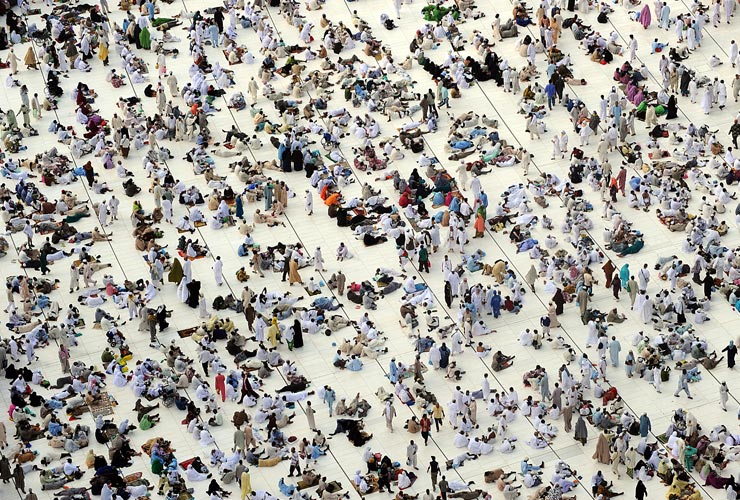What is the Hajj and will it be cancelled?
Two million people expected to take part in annual Islamic pilgrimage

A free daily email with the biggest news stories of the day – and the best features from TheWeek.com
You are now subscribed
Your newsletter sign-up was successful
Saudi Arabia has asked Muslims to delay plans to attend the annual Hajj pilgrimage until there is more clarity about the coronavirus pandemic.
The BBC reports that approximately two million people were expected to travel to Mecca and Medina this July and August for the gathering.
“Saudi Arabia is fully ready to serve pilgrims and Umrah seekers,” Mohammed Saleh Benten, minister for Hajj and Umrah, told the state-run Al-Ekhbariya television.
The Week
Escape your echo chamber. Get the facts behind the news, plus analysis from multiple perspectives.

Sign up for The Week's Free Newsletters
From our morning news briefing to a weekly Good News Newsletter, get the best of The Week delivered directly to your inbox.
From our morning news briefing to a weekly Good News Newsletter, get the best of The Week delivered directly to your inbox.
“But under the current circumstances, as we are talking about the global pandemic... the kingdom is keen to protect the health of Muslims and citizens and so we have asked our brother Muslims in all countries to wait before doing [Hajj] contracts until the situation is clear.”
How widespread is coronavirus in Saudi Arabia?
According to real-time statistics site Worldometer, the kingdom has reported 1,720 confirmed coronavirus cases and 16 deaths.
Health minister Tawfiq Al Rabiah has said that the kingdom will finance treatment for anyone infected with the coronavirus in the country, reports Al Jazeera. “We are all in the same boat,” he said.
A free daily email with the biggest news stories of the day – and the best features from TheWeek.com
Saudi Arabia’s agriculture ministry also said it had taken steps to boost wheat and livestock supplies due to global fears of a food shortage.
What is the Hajj?
The annual pilgrimage is a religious obligation for all Muslims, wealth and health permitting. The journey is seen as one of the five pillars of Islam, central to the faith, and pilgrims spend five days praying both in Mecca and the surrounding desert.
In order to be closer to God, those who make the pilgrimage wear simple clothes, are prohibited from arguing and perform rituals such as throwing stones at pillars to symbolise rejecting evil.
Hajj is required of all able-bodied Muslims at least once in their life.
[[{"type":"media","view_mode":"content_original","fid":"100097","attributes":{"class":"media-image"}}]]
When is it?
The Hajj falls during the eighth and the twelfth day of the month of Dhul Hijjah, the last month of the Islamic calendar. In the Gregorian calendar this year's Hajj falls between the 28 July and 2 August.
The pilgrimage coincides with the Islamic festival of Eid al-Adha, a time when Muslims commemorate the Prophet Abraham.
Muslims can visit Mecca and surrounding holy sites at any time of the year but outside of the Hajj it is called “Umrah”.
–––––––––––––––––––––––––––––––For a round-up of the most important stories from around the world - and a concise, refreshing and balanced take on the week’s news agenda - try The Week magazine. Start your trial subscription today –––––––––––––––––––––––––––––––
How many people go?
More than two million people performed the Hajj in 2019, with officials forced in recent years to limit the number of pilgrims.
Saudi Arabia suspended the year-round Umrah pilgrimage earlier this month over fears of the new coronavirus spreading to Islam’s holiest cities. Ministers have confirmed that people who had purchased Umrah visas that could not be used would be refunded the cost.
There is no gender segregation at the Grand Mosque during the Hajj, unlike many other Muslim rites. Men and women stand side by side in what some have said is meant to show everyone's equality before God.
Has there been issues before?
The Hajj has not been cancelled outright in modern times. But curbing attendance has happened before, Al Jazeera reports, including in recent years during the Ebola outbreak.
“Disease outbreaks have regularly been a concern surrounding the Hajj,” the site says, adding that the earliest outbreak came in 632 as pilgrims fought off malaria.
A cholera outbreak in 1821 also killed an estimated 20,000 pilgrims, while a second outbreak of the disease in 1865 killed 15,000 pilgrims before spreading worldwide.
In 2015, a stampede during the "stoning of the devil" caused the deaths of at least 2,177 people. A safety review was ordered over Saudi Arabia's handling of the event.
It was the worst incident since 1990 when a stampede in a pedestrian tunnel leading from Mecca towards Mina led to the deaths of 1,426 people.
After the disaster, authorities began fitting all pilgrims with electronically tagged bracelets, which are connected with GPS and contain medical details in the event of an emergency.
More than 1,000 security cameras were also installed at holy sites prone to overcrowding, so organisers could oversee capacity.
-
 The EU’s war on fast fashion
The EU’s war on fast fashionIn the Spotlight Bloc launches investigation into Shein over sale of weapons and ‘childlike’ sex dolls, alongside efforts to tax e-commerce giants and combat textile waste
-
 How to Get to Heaven from Belfast: a ‘highly entertaining ride’
How to Get to Heaven from Belfast: a ‘highly entertaining ride’The Week Recommends Mystery-comedy from the creator of Derry Girls should be ‘your new binge-watch’
-
 The 8 best TV shows of the 1960s
The 8 best TV shows of the 1960sThe standout shows of this decade take viewers from outer space to the Wild West